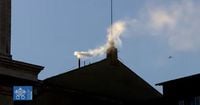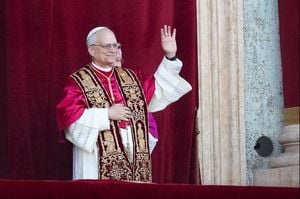In a historic conclave that has captured the world's attention, Cardinal Robert Francis Prevost has been elected as the new Pope of the Catholic Church, taking the name Leo XIV. This momentous event unfolded on May 8, 2025, when white smoke billowed from the Sistine Chapel chimney, signaling the cardinals' decision after a series of votes. Prevost, a 69-year-old American born in Chicago and a former archbishop of Chiclayo, Peru, becomes the first North American pope in history.
The announcement came at approximately 14h15min local time, with the faithful gathered in St. Peter's Square awaiting the new pontiff. The election was notably swift, occurring on the second day of the conclave, following a pattern established in the previous two conclaves of 2013 and 2005. The consensus among the cardinals was reached at 13h07min in Brazil, after the fourth ballot had been cast.
Prevost's election marks a significant shift in the papacy, as he brings a unique background to the role. He has dual citizenship, American and Peruvian, which may have played a crucial role in his selection. His extensive experience in Latin America, where he served as archbishop, has positioned him as a key figure in the Church's outreach efforts to diverse communities.
In his inaugural speech, Prevost emphasized the need for the Church to be a "missionary" institution, stating, "We must seek together how to be a missionary church, building bridges of dialogue, always open to receive, like this square, all those who need our charity, our presence, and our dialogue of love." This message resonates with the Church's current challenges, including internal divisions and a pressing need for reform.
Prevost's path to this historic position has been marked by notable achievements. In 2023, he was appointed by Pope Francis to lead the Dicastery for Bishops, a pivotal role that involves overseeing episcopal appointments worldwide. His selection for this influential position signaled Francis's confidence in Prevost's reformist vision for the Church.
Moreover, Prevost has been a proponent of inclusivity within the Church. He was instrumental in the unprecedented decision to include three women in the bishop selection process, a move that reflects a commitment to modernizing the Church's governance structures. This progressive stance has garnered support from various quarters, with allies describing him as a "man of humor and joy, even under pressure," according to Pe. Fidel Purisaca Vigil, a former communications director in Chiclayo.
Prevost's election comes amidst expectations that a cardinals from Africa, such as Fridolin Ambongo Besungu from the Democratic Republic of Congo or Robert Sarah from Guinea, might ascend to the papacy. However, the cardinals ultimately chose Prevost, whose extensive mission work and dual heritage likely resonated with their desire for a leader who could bridge cultural divides.
Taking the name Leo XIV, Prevost harkens back to Pope Leo XIII, who served from 1878 to 1903 and is renowned for his social encyclical, Rerum Novarum, which advocated for labor rights. This choice of name may signal a continuity with the reformist agenda of his predecessor, Pope Francis, as the Church navigates contemporary issues such as secularization in the West and internal strife between conservative and progressive factions.
As Pope Leo XIV, Prevost will face a series of challenges, including managing the ongoing financial scandals that have plagued the Vatican and addressing the growing secularization of society. His official inauguration is anticipated to take place next week, following traditional rites at St. Peter's Basilica.
The election of a North American pope is a historical milestone for the Catholic Church, reflecting the changing demographics of its global congregation. As the Church continues to grapple with modernity, Prevost's leadership may offer a path forward that embraces dialogue and inclusivity, aligning with the evolving expectations of its followers.




